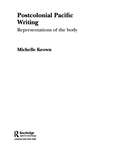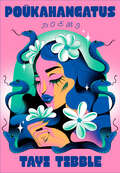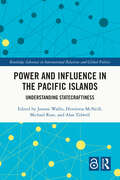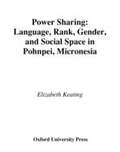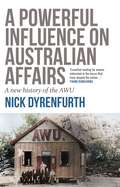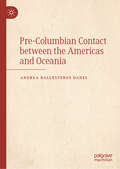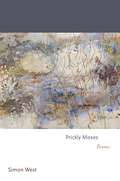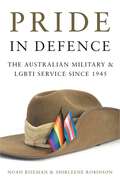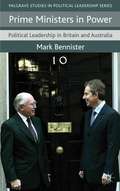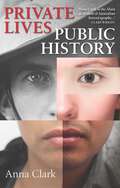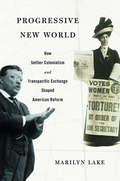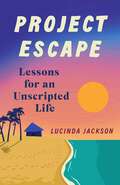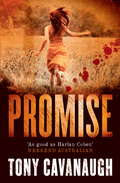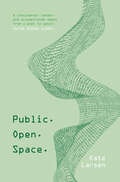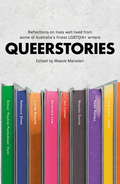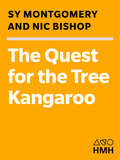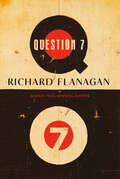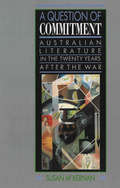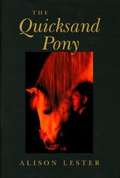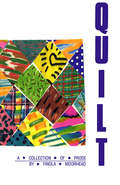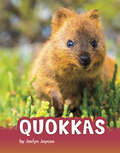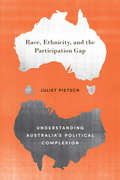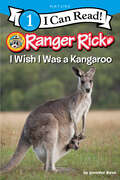- Table View
- List View
Postcolonial Pacific Writing: Representations of the Body (Routledge Research in Postcolonial Literatures #Vol. 9)
by Michelle KeownThis major new interdisciplinary study focuses on the representation of the body in the work of eight of Polynesia's most significant contemporary writers. Drawing on anthropology, psychoanalysis, philosophy, history and medicine, Postcolonial Pacific Writing develops an innovative postcolonial framework specific to the literatures and cultures of this region.
Poukahangatus: Poems
by Tayi TibbleThe American debut of an acclaimed young poet as she explores her identity as a twenty-first-century Indigenous woman. Poem by poem, Tibble carves out a bold new way of engaging history, of straddling modernity and ancestry, desire and exploitation.Intimate, moving, virtuosic, and hilarious, Tayi Tibble is one of the most exciting new voices in poetry today. In Poūkahangatus (pronounced &“Pocahontas&”), her debut volume, Tibble challenges a dazzling array of mythologies—Greek, Māori, feminist, kiwi—peeling them apart, respinning them in modern terms. Her poems move from rhythmic discussions of the Kardashians, sugar daddies, and Twilight to exquisite renderings of the natural world and precise emotions (&“The lump in her throat swelled like a sea that threatened to take him from her, and she had to swallow hard&”). Tibble is also a master narrator of teenage womanhood, its exhilarating highs and devastating lows; her high-camp aesthetics correlate to the overflowing beauty, irony, and ruination of her surroundings. These are warm, provocative, and profoundly original poems, written by a woman for whom diving into the wreck means taking on new assumptions—namely, that it is not radical to write from a world in which the effects of colonization, land, work, and gender are obviously connected. Along the way, Tibble scrutinizes perception and how she as a Māori woman fits into trends, stereotypes, and popular culture. With language that is at once colorful, passionate, and laugh-out-loud funny, Poūkahangatus is the work of one of our most daring new poets.
Power and Influence in the Pacific Islands: Understanding Statecraftiness (Routledge Advances in International Relations and Global Politics)
by Joanne Wallis Henrietta McNeill Michael Rose Alan TidwellThis book outlines an analytical framework to understand power, influence, and statecraft in the Pacific Islands region. With contributions by scholars from the United States, Australia, China, New Zealand, and across the Pacific Islands region, it provides ‘both sides of the story’ of statecraft and explores how power and influence are being exercised in the Pacific Islands. Amid escalating strategic competition, the United States, China, Australia, and a range of other partners are trying to exercise power and influence in their Pacific Islands region through their statecraft. But which partners are doing what, where are they doing it, and how are Pacific Island countries and people responding? Through case studies of key examples – such as economic assistance, defence diplomacy, scholarships, and strategic narratives – this book analyses how tools of statecraft are being deployed by a range of key partners and Pacific Island states, and how they are being received by Pacific Island countries and people.A vital resource for scholars and practitioners in International Relations and diplomacy as well as those seeking to understand how statecraft, power, and influence are being exercised in the Pacific Islands region.The Open Access version of this book, available at http://www.taylorfrancis.com, has been made available under a Creative Commons [Attribution-Non Commercial-No Derivatives (CC-BY-NC-ND)] 4.0 license.
Power Crisis
by Rodney CavalierWritten by former minister and Labor historian Rodney Cavalier, Power Crisis is an explosive account of the self-destruction of the New South Wales Labor government, which has seen a turnover of four premiers in five years, and is heading for rejection and even humiliation by voters at the next state election. While the catalyst was the thwarted attempt to privatise electricity, Cavalier reveals that the real issue is the takeover of Labor by a professional political class without connection to the broader community or the party's traditions. Featuring interviews with ex-premiers Iemma and Rees, Power Crisis contrasts the current turmoil and self-indulgence with the stability within New South Wales Labor over generations before, and asks, 'What went wrong?'
Power Sharing: Language, Rank, Gender and Social Space in Pohnpei, Micronesia
by Elizabeth KeatingLinguistic anthropologist Elizabeth Keating went to the island of Pohnpei, in Micronesia, and studied how people use language and other semiotic codes to reproduce and manipulate status differences.
Powerful Influence on Australian Affairs: A New History of the AWU
by Nick DyrenfurthIn this new history of the Australian Workers' Union, prominent author Nick Dyrenfurth traces the fortunes of the nation's oldest continuously operating trade union from its origins in the shearing sheds of the late nineteenth century through to it present-day representation of modern Australia's diverse workforce. The 131-year-old AWU's coverage of rural and regional industries, impact on Australia's national identity, and sway over the ALP have made the union a unique organisation internationally. A Powerful Influence on Australian Affairs tells the story of the AWU's numerous triumphs and crises, colourful characters and famed leaders, political influence, and the changing working lives and aspirations of its rank-and-file membership.
Pre-Columbian Contact between the Americas and Oceania
by Andrea Ballesteros - DanelThis book weaves together theories of pre-Columbian trans-Pacific contact between Oceania and the Americas and analyses them from a history of ideas perspective. Despite limited factual evidence, trans-Pacific contact theories between the Americas and Oceania have been discussed in various forms since the sixteenth century and remain a persistent trope. To provide a context for the history of ideas of trans-Pacific contact involving the Americas and Oceania, this book addresses the changing conceptions of the Pacific according to scholars from Europe and the Americas, the development of science and later anthropology and archaeology in this region and in the Americas, and the growing understanding of the history of settlement of the Americas and the Pacific. This book covers views predominantly from the Global South, making them more accessible to an Anglophone audience worldwide.
Prickly Moses: Poems
by Simon WestCompelling poems that celebrate language as it encounters the nameless variety of the natural world, from Australia to ItalyAn uncanny blend of the external and the intimate has been a hallmark of Simon West’s poetry for nearly twenty years. In this new collection, the Australian poet and Italianist delights in the transforming and endlessly varied powers of naming and speaking. West’s intensely regional focus stands in dialogue with Europe and antiquity. Landscapes reveal the tangle of their historical dimensions, as the rivers of both the Goulburn Valley in southeastern Australia and the Po Valley in northern Italy merge and flow into the wider currents of the Southern Ocean. Again and again, language and the senses throw themselves into the nameless riot of the world, from eucalypts and clouds to a medieval bell tower and the sounds a pencil makes as it crosses a page.
Pride in Defence: The Australian Military and LGBTI Service since 1945
by Noah Riseman Shirleene RobinsonSince the Second World War the Australian military has undergone remarkable transformations in the way it has treated lesbian, gay, bisexual, transgender and intersex service members: it has shifted from persecuting, hunting and discharging LGBTI members to embracing them as valued members who enhance the Force's capabilities. LGBTI people have served in the Australian military since its very beginnings, yet Australian Defence Force histories have been very slow to recognise this. Pride in Defence confronts that silence. It charts the changing policies and practices of the ADF, illuminating the experiences of LGBTI members in what was often a hostile institution. Drawing on over 140 interviews and previously unexamined documents, Pride in Defence features accounts of secret romances, police surveillance and traumatic discharges. At its centre are the courageous LGBTI members who served their country in the face of systemic prejudice. In doing so, they showed the power of diversity and challenged the ADF to make it a far stronger institution.
Prime Ministers in Power
by Mark BennisterTony Blair and John Howard appear to be incongruous choices for comparative analysis. Howard was from the ideological right of Australian politics, with a leadership style based on experience and an uncharismatic, cautious, bureaucratic persona. Blair was the charismatic, new progressive centre-left leader with an emotional, thespian style, stressing vision and moral imperatives. Yet, it is possible to identify both personal and institutional similarities. This book argues that both leaders stretched the institutional resources available to them and enhanced their own personal capital. Over time, the political capital generated by each inevitably fell away to the extent that they both (although for contrasting reasons) left office in 2007. Prime Ministers in Powerinvestigates prime ministerial predominance in Britain and Australia. It is a timely addition to the scholarly material on political leadership, adding a comparative dimension by using case study analysis of two prime ministers in similar political systems. How did these two prime ministers establish such predominant positions? How far can prime ministers stretch the institutions within which they work and how much of an impact does the office-holder have on the office? What conclusions can be drawn from the comparison of the two prime ministers? What are the consequences and costs of such predominance? This book addresses these questions, offering a comparative perspective on the nature of prime ministerial leadership.
Private Lives, Public History
by Anna ClarkThe past is consumed on a grand scale: popularised by television programs, enjoyed by reading groups, walking groups, historical societies and heritage tours, and supported by unprecedented digital access to archival records. Yet our history has also become the subject of heated political contest and debate. In Private Lives, Public History, historian Anna Clark explores how our personal pasts intersect with broader historical questions and debates. Drawing on interviews with Australians from five communities around the country, she uncovers how we think about the past in the context of our local and intimate stories, and the role history plays in our lives.
Progressive New World: How Settler Colonialism and Transpacific Exchange Shaped American Reform
by Marilyn LakeIn a bold argument, Marilyn Lake shows that race and reform were mutually supportive as Progressivism became the political logic of settler colonialism at the turn of the 20th century. She points to exchanges between American and Australasian reformers who shared racial sensibilities, along with a commitment to forging an ideal social order.
Project Escape: Lessons for an Unscripted Life
by Lucinda JacksonLucinda Jackson, a harried scientist and business executive, sets off to make a break from her corporate decades and have an “extraordinary” retirement. She launches into a five-phase “Project Escape,” complete with a vision, goals, and a scorecard of success to deliver this next chapter. Soon, Jackson and her semi-reluctant husband of thirty years are off as volunteers to the government of the Pacific island country of Palau. But while Jackson got the girl out of the corporation, even the jolt of Palau can’t fully get the corporation out of the girl. As she struggles through self-examination around purpose, identity, ego, marriage, and parenthood after years of investing so much in career, Jackson gradually learns who she is again. Whether you’re thinking ahead to retirement or are already there, Project Escape provides an unvarnished but ultimately encouraging reference in navigating the “post-career” era.
Promise: Promise And Dead Girl Rising (Darian Richards Ser. #1)
by Tony CavanaughAn Australian crime thriller 'as good as Harlan Coben' - Weekend Australian.A serial killer is stalking the Sunshine Coast. Girls have vanished. All blonde and pretty. Ex homicide investigator Darian Richards knows they are dead even though the cops keep saying 'missing'. That's what you have to say if you don't have a body.Jenny Brown was the first. The local cops said runaway. Then others disappeared. They couldn't all be runaways.This killer knows how to stay under the radar, how to hide in plain sight. He knows how to hunt, hurt and kill. Darian has seen evil like him before and knows what it takes to make it stop. He'll make sure the killer gets what he deserves... and that's a promise. A devastatingly brilliant crime novel that gives us a horrifying glimpse into the mind of a diabolical killer and introduces us to one of the most complex and uncompromising heroes since Harry Bosch.Tony Cavanaugh is an Australian writer and producer of film and television with over thirty years' experience in the industry. His new novel, Dead Girl Sing also features former cop Darian Richards and is on sale now.'Never relinquishes its hold on your nerves' - Canberra Times'Couldn't stop reading it. One of the freshest and most well-written novels I've come across this year' - Graeme Blundell, crime reviewer, The Australian 'The best thing about this book is that it looks like there will be a second one' - Australian Bookseller & Publisher'Compulsive reading, Promise itself is more menacing, more disturbing and much more confronting than any other crime thriller on the shelves. It is brutal. It is terrifying. It is a brilliant book' - Rob Monshull, Weekends Producer, ABCThe Darian Richards SeriesPromiseDead Girl SingThe Soft Touch (Short Story)The Train RiderKingdom of the Strong
The Proud: An Illustrated History of the 6th Australian Division, 1939-1946
by Mark JohnstonFollowing Mark Johnston's acclaimed illustrated histories of the 7th and 9th Australian Divisions, this is his long-awaited history of the 6th Australian Division: the first such history ever published. The 6th was a household name during World War II. It was the first division raised in the Second Australian Imperial Force, the first division to go overseas and the first to fight. Its success in that fight, in Libya in 1941, indicated that the standard established in the Great War would be continued. General Blamey and nearly every other officer who became wartime army, corps and divisional commanders were once members of the 6th Division. Through photographs and an authoritative text, this book tells their story and the story of the proud, independent and tough troops they commanded.
Public. Open. Space
by Kate LarsenPublic. Open. Space. is a collection of poetry inspired by spaces, places and situations that are controlled and contested online and in real life. Looking at firewalls and feminism, activism and apathy, Public. Open. Space. explores freedom and suppresion, censorship and silencing, propaganda and protest, as well as the difference between being told ‘ no' and choosing to say it ourselves.
Queerstories: Reflections on lives well lived from some of Australia's finest LGBTQIA+ writers
by Maeve MarsdenThere's more to being queer than coming out and getting married. This exciting and contemporary collection contains stories that are as diverse as the LGBTQIA+ community from which they're drawn. From hilarious anecdotes of an awkward adolescence, to heartwarming stories of family acceptance and self-discovery, the LGBTQIA+ community has been sharing stories for centuries, creating their own histories, disrupting and reinventing conventional ideas about narrative, family, love and community.Curated from the hugely popular Queerstories storytelling event this important collection features stories from Benjamin Law, Jen Cloher, Nayuka Gorrie, Peter Polites, Candy Royalle, Rebecca Shaw, Simon 'Pauline Pantsdown' Hunt, Steven Lindsay Ross, Amy Coopes, Paul van Reyk, Mama Alto, Liz Duck-Chong, Maxine Kauter, David Cunningham, Peter Taggart, Ben McLeay, Jax Jacki Brown, Ginger Valentine, Candy Bowers, Simon Copland, Kelly Azizi, Nic Holas, Quinn Eades, Vicki Melson, Tim Bishop and Maeve Marsden.
The Quest for the Tree Kangaroo: An Expedition to the Cloud Forest of New Guinea (Scientists in the Field Series)
by Sy Montgomery Nic Bishop<P>It looks like a bear, but isn't one. It climbs trees as easily as a monkey- but isn't a monkey, either. It has a belly pocket like a kangaroo, but what's a kangaroo doing up a tree? Meet the amazing Matschie's tree kangaroo, who makes its home in the ancient trees of Papua New Guinea's cloud forest. And meet the amazing scientists who track these elusive animals. <P>[This text is listed as an example that meets Common Core Standards in English language arts in grades 4-5 at http://www.corestandards.org.] <P><P> Winner of the Sibert Honor
Question 7
by Richard FlanaganAn exquisite, genre-defying new book from the Booker Prize–winning author of The Narrow Road to the Deep North, a reckoning with the author&’s life and family, and the role of fiction in our times"A spectacular mixture of fierce energy and then control, care. It is a kind of reckoning, Richard Flanagan with his father and his mother, Tasmania with its past, Japan with its past, the author with himself. It seems to me a book that will have an overwhelming effect on readers.&” —Colm Tóibín, author of Long IslandSometimes I wonder why we keep returning to beginnings—why we seek the single thread we might pull to unravel the tapestry we call our life...By way of H. G. Wells and Rebecca West&’s affair through 1930s nuclear physics to Flanagan's father working as a slave laborer near Hiroshima when the atom bomb is dropped, this daisy chain of events reaches fission when Flanagan as a young man finds himself trapped in a rapid on a wild river not knowing if he is to live or to die.At once a love song to his island home and to his parents, this hypnotic melding of dream, history, place and memory is about how our lives so often arise out of the stories of others and the stories we invent about ourselves.
A Question of Commitment: Australian literature in the twenty years after the war
by Susan LeverIn the years since the Second World War, Australia has seen a period of literary creativity which outshines any earlier period in the nation's literary history. This creativity has its beginnings in the arguments and alignments which emerged at the end of the War, and the changes in perceptions of art and society which occurred during the fifties and early sixties.A Question of Commitment examines the attitudes of writers as diverse as James McAuley, Frank Hardy, Judith Wright, Patrick White and A. D. Hope, as they responded to a changing Australian society during the postwar years. Through their work and that of many others, it considers the debates about literary nationalism, the artistic politics of the Cold War, the threat of technology to art in the Atomic Age, and the nature of the writer's role in the new society. It documents the way in which the political commitments of some writers and the resistance to commitment of others were challenged by political and social changes of the late fifties.Susan McKernan's lively exploration of Australia's writers in a time of innovation provides the reader with the context needed to understand the creative choices they made and, in so doing, introduces wider intellectual and cultural issues which remain relevant to this day.
The Quicksand Pony
by Alison Lester"Biddy, I'm sorry, we're going to have to leave her." "What?" Biddy struggles out of the quicksand. "You can't leave her! The tide's coming in. She'll drown!" But the pony is trapped and Biddy is forced to go on without her. The next day the only signs of Bella are hoof prints in the sand...with small footprints and the paw marks of a dog. Who has rescued Bella? Who could be so small and be alone on this remote beach? Biddy's search takes her into a wild secret country where she discovers the truth about a mysterious disappearance that happened many years ago.
Quilt: A Collection of Prose
by Finola MoorheadAward-winning author, Finola Moorhead stitches together essays, reviews and short stories that make an incisive comment of the process of writing.
Quokkas (Animals)
by Jaclyn JaycoxQuokkas might be the cutest animals you’ve never heard of. These furry little creatures look like a cross between a kangaroo and a squirrel. Get fun details about this adorable Australian animal.
Race, Ethnicity, and the Participation Gap: Understanding Australia's Political Complexion (G - Reference, Information and Interdisciplinary Subjects)
by Juliet PietschRace, Ethnicity, and the Participation Gap begins with the argument that political institutions in settler and culturally diverse societies such as Australia, the United States, and Canada should mirror their culturally diverse populations. Compared to the United States and Canada, however, Australia has very low rates of immigrant and ethnic minority political representation in the Commonwealth Parliament, particularly in the House of Representatives. The overall existence of racial hierarchies within formal political institutions represents an inconsistency with the democratic ideals of representation and accountability in pluralist societies. Drawing on findings from the United States, Canada, and Australia, Juliet Pietsch reveals that the lack of political representation in Australia is significant when compared to the United States and Canada, revealing a serious democratic deficit. Her book is devoted to exploring this central puzzle: why is it that, despite having a similar history to other settler countries, Australia shows such comparatively low rates of political participation among its immigrant and ethnic minority populations from non-British and European backgrounds? In addressing this crucial question, Race, Ethnicity, and the Participation Gap examines the impact of Australia’s alternative path on the political representation of immigrants and ethnic minorities.
Ranger Rick: I Wish I Was a Kangaroo (I Can Read Level 1)
by Jennifer BovéExplore the lives of kangaroos with Ranger Rick in this Level One I Can Read with vivid color photos!What if you wished you were a kangaroo and then you became one? Could you eat like a kangaroo? Move like a kangaroo? Live in a kangaroo family? And would you want to? Find out!This Level One I Can Read answers questions for beginning readers about kangaroos. This format engages young readers by comparing and contrasting the life of the kangaroo to the life of the reader. In call-outs, Ranger Rick asks the reader things like: Can you hop like a kangaroo?Did you know that some kangaroos are great swimmers? Did you know that kangaroos are really fast and can hop up to 40 miles per hour? From Tree Kangaroos to the Rock Wallaby to the more familiar Red Kangaroos, young Ranger Rick explorers will love this Level One I Can Read that helps beginning readers dig a little deeper into the amazing lives of kangaroos.Ranger Rick: I Wish I Was a Kangaroo is complete with fascinating facts, vivid photographs, a Wild Words glossary, and a hands-on activity where you find out how far you can jump—just like a kangaroo!This Level 1 I Can Read story is perfect for children ages 5 to 7 who are ready to read independently. Whether shared at home or in a classroom, the short sentences, familiar words, and simple concepts of Level One books support success for children eager to start reading on their own.
